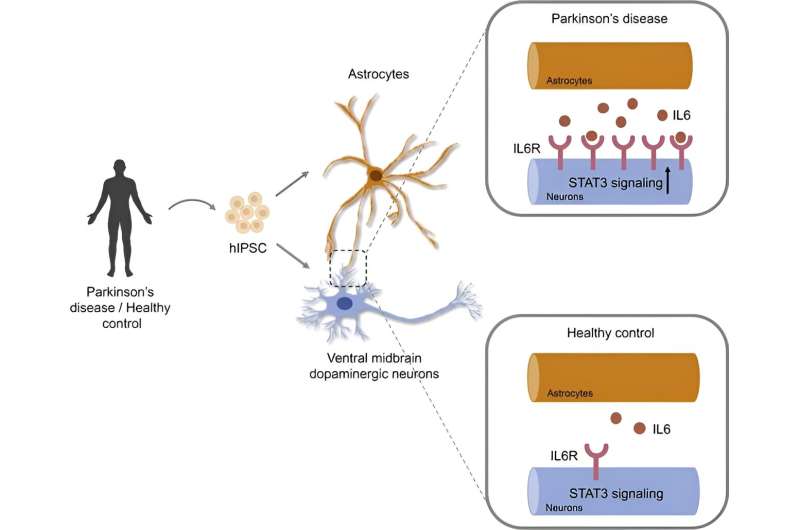This article has been reviewed according to Science X's editorial process and policies. Editors have highlighted the following attributes while ensuring the content's credibility:
fact-checked
trusted source
proofread
Researchers identify immunomodulatory drug as a potential treatment for Parkinson's disease

Parkinson's disease is one of the most common diseases affecting the motor and nervous system. It has no treatment yet, and the pathology causes a deterioration of motor skills due to dopaminergic neuronal death, the neurons that synthesize dopamine, which is a brain neurotransmitter that controls the volunteer movements.
Now, a study on Parkinson's published in the Journal of Clinical Investigation Insight reveals that brain cells called astrocytes are reactive, attacking and removing nervous cells that generate dopamine in the midbrain.
The study was led by the experts on stem cells and neurodegeneration Antonella Consiglio, head of a research group at the Faculty of Medicine and Health Sciences of the University of Barcelona, the Institute of Biomedicine of the UB (IBUB), the Bellvitge Biomedical Research Institute (IDIBELL) and ICREA Academy researcher, and Àngel Raya, member of IDIBELL and the Bioengineering, Biomaterials and Nanomedicine Networking Biomedical Research Center (CIBER-BBCN), in collaboration with the teams of neurologists led by Eduard Tolosa and Alícia Garrido, from the Parkinson and Movement Disorders Unit at Hospital Clínic.
The team worked on induced pluripotent stem cells (iPSC) from patients with Parkinson's. Their study indicates that the astrocytes in the brains of Parkinson's' patients overexpress the inflammatory cytokine IL-6, which induces the death of dopaminergic neurons.
"Although the mild inflammation can be beneficial for many neuronal processes, the overproduction of IL-6 can worsen the symptoms of Parkinson's disease, and this may be an important therapeutic target," says Meritxell Pons-Espinal (UB-IBUB-IDIBELL), principal author of the study.
"It's important to stress that the treatment of neuronal cultures with tocilizumab, an antibody that is already used daily in the hospital to treat rheumatoid arthritis and which blocks the effect of IL-6-secreting astrocytes, largely prevents nerve cell death," says Manel Juan, immunologist at the Hospital Clinic and co-author of the study.
As Consiglio states, "If we could find the right way to modulate the immune system, we could slow down the process of this disease."
More information: Meritxell Pons-Espinal et al, Blocking IL-6 signaling prevents astrocyte-induced neurodegeneration in an iPSC-based model of Parkinson's disease, Journal of Clinical Investigation Insight (2024). DOI: 10.1172/jci.insight.163359. insight.jci.org/articles/view/163359




















